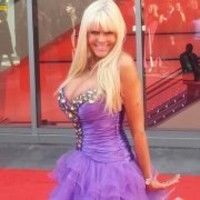Thoughts on lenses? If you were making a microbudget feature, what lens would you rent for a 7d?
Jesse Cardoza: Director of photography, first assistant camera and gaffer/lighting technician in Boston, Massachusetts.
The Great Debate: Film vs. Digital
Fascinating story filled with important information for those of us that aren't cinematographers. In particular it's interesting to learn of Q. Tarrantino's commitment to film and most recently the 70 mm format: http://goo.gl/veC4Bt

Film or digital is less of a which is better. The argument is whats are you trying to tell. Maybe like Tarantino you wish to reference older cinema, like film. Maybe you want a specific grain. A lot o...
Expand commentCould this generation get a new film experience?
This article makes me feel extremely hopeful for the future of film. I firmly believe that in order to be a great storyteller in the medium of film, you need to know what it's like to shoot on film. You need to hear the film stock running though the camera. You need to know the pressure of being nea...
Expand post
The key benefit to learning on film was expense. If there is a huge incentive to turn the camera off, you learn intentional shooting and turn it on only when you should. The video trained shoot too mu...
Expand comment
What an interesting point of discussion Joe! You are definitely an old soul in a young body. As for me, I feel blessed to have started in the industry when camera negative was the standard for motion...
Expand comment
Curt, the "film was better" nostalgia is whats crap to me. What is not crap was the autonomy of the DP and camera crew, because of the very waning craft you mention. The film disciplined experience wa...
Expand comment
Hi Jesse. I'm RB, Founder and CEO of Stage 32. As a screenwriter, producer, actor and filmmaker, I know first-hand the challenges all creatives face finding work, landing representation, launching projects, securing funding and simply making the connections that will make a difference in their careers. That's why I created Stage 32. Since our launch in September of 2011, the community has grown to 1,000,000+ members representing every country on the planet making Stage 32 the social network uniquely populated with the most creative people on Earth.
This is a network for you, built by you. Like...
Expand post
Hello Jesse -
Welcome to the community! I'm Amanda Toney, the Managing Director at Stage 32. Since 2013 I've been proud to oversee Stage 32's Next Level Education, which provides you the most up-to-date tools necessary to become a better creative.
Over the years Stage 32 has worked with over 500 industry executives and professionals to teach online webinars, classes and intensive labs exclusively for you - our Stage 32 community. We bring you instructors who have worked directly on some of your favorite films, TV shows or theater productions to teach you in-the-trenches information that you wo...
Expand post











Wide angle lenses - 14mm - 24mm will give you added value visually. Can't go wrong with a 50mm and 85mm ... shoot flat (low contrast, drop your saturation down one notch, and drop your sharpness down...
Expand commentWide angle lenses - 14mm - 24mm will give you added value visually. Can't go wrong with a 50mm and 85mm ... shoot flat (low contrast, drop your saturation down one notch, and drop your sharpness down one notch). Using sticks (a tripod) will give you added production value. If you shoot hand-held after you frame, step back two paces and shoot loose. You can always stabilize the shot to give it a more fluid feel.
Some still lenses have the ability to capture the light favorably for kinetics. When you see Cine lens across your lens housing. The manufacturer is guaranteeing this lens has the ability to capture l...
Expand commentSome still lenses have the ability to capture the light favorably for kinetics. When you see Cine lens across your lens housing. The manufacturer is guaranteeing this lens has the ability to capture light properly. Also the housing is built for cinema purposes( cine gears, "de-clicked" f stop, and a t stop). If you filmed on a Zeiss distagon 35mm ZE. 1.4( still lens) and a Zeiss Compact prime 1.5 your gonna have a hard time distinguishing which images is from which lens. Know why? They r the same elements in different housing! Manufacturers want to take advantage of us filmakers fan girling over the word "cine". L SERIES GLASS= canon cine primes . Rokinon still line = rokinon cine line. Practically the only manufacturer that does not practice this marketing strategy is Panavission and Cooke and vantage. But i am only aware they make motion picture lenses( do share if otherwise). Do your research and you will find a whole list of lenses able to render kight well enough for cinema. Fyi STANLEY KUBRICK shot on hassleblad still lenses.
I’m guessing you are referring to the lenses used in the candlelight scenes from Barry Lyndon. Sorry, but they are not Hasselblad but Zeiss Planar f0.7 lenses. Hasselblad does not make lenses. The iss...
Expand commentI’m guessing you are referring to the lenses used in the candlelight scenes from Barry Lyndon. Sorry, but they are not Hasselblad but Zeiss Planar f0.7 lenses. Hasselblad does not make lenses. The issues with uses stills lenses are not always quality, but rather the mechanical working of the lens and the ergonomics. Stills lenses are static in normal usage when taking a shot, in cinema lenses we are always changing, focus, zoom or iris during shots. The lenses have to track all of these changes perfectly with absolutely no play in the controls when rotated in both directions and when changing rotational direction during a shot. This is a fairly demanding request. Further we want large amounts of element rotation in order to have more witness marks on the lens, although news and documentary lenses typically have a focus barrel rotation of about 90˚ so fewer marks closer together. Modifying a stills lens to work for our usage is “complicated”, which ends up being spelled with lots of $$$.